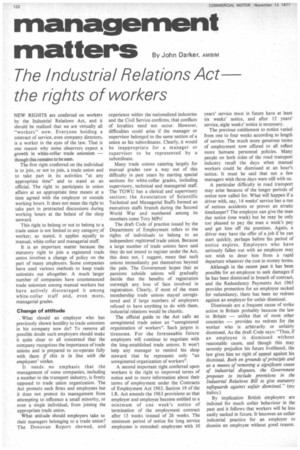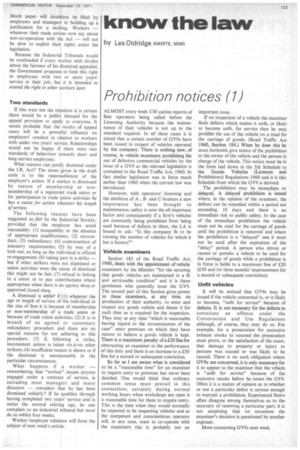management
Page 124

Page 125

If you've noticed an error in this article please click here to report it so we can fix it.
matters By John Darker, AMBIM
The Industrial Relations Act the rights of workers
NEW RIGHTS are conferred on workers by the Industrial Relations Act, and it should be realized that we are virtually all "workers" now. Everyone holding a contract of service, even company directors, is a worker in the eyes of the law. That is one reason why some observers expect a growth in white-collar trade unionism — though this remains to be seen.
The first right conferred on the individual is to join, or not to join, a trade union and to take part in its activities "at any appropriate time" and to stand as an official. The right to participate in union affairs at an appropriate time means at a time agreed with the employer or outside working hours. It does not mean the right to take part in protracted discussions during working hours at the behest of the shop steward.
This right to belong or not to belong to a trade union is not limited to any category, of worker; as stated, it applies equally to manual, white collar and managerial staff.
It is an important matter because the statutory right to join a registered trade union involves a change of policy on the part of many employers. Some cornpanies have used various methods to keep trade unionists out altogether. A much larger number of companies have countenanced trade unionism among manual workers but have actively discouraged it among white-collar staff and, even more, managerial grades.
Change of attitude What should an employer who has previously shown hostility to trade unionism in his company now do? To remove all possible doubt such employers should make it quite clear to all concerned that the company recognizes the importance of trade unions and is prepared to co-operate fully with them if this is in line with the employees' wishes.
It needs no emphasis that the management of some companies, including a number in the transport industry, is firmly opposed to trade union organization. The Act protects such firms and employees but it does not protect its management from attempting to influence a small minority, or even a single individual, from joining the appropriate trade union.
What attitude should employers take to their managers belonging to a trade union? The Donovan Report showed, and experience within the nationalized industries and the Civil Service confirms, that conflicts of loyalties need not occur. However, difficulties could arise if the manager or supervisor belonged to the same section of a union as his subordinates. Clearly, it would be inappropriate for a manager or supervisor to be represented by a subordinate.
Many trade unions catering largely for manual grades saw a way out of this difficulty in past years by starting special sections for white-collar grades, including supervisory, technical and managerial staff. The TGWU has a clerical and supervisory section; the Association of Scientific Technical and Managerial Staffs formed an executives staffs branch during the Second World War and numbered among its members some Tory MPs!
The draft Code of practice issued by the Department of Employment refers to the rights of individuals to belong to an independent registered trade union. Because a large number of trade unions have said they do not intend to register under the Act, this does not, I suggest, mean that such unions immediately put themselves beyond the pale. The Government hopes that as passions subside unions will gradually decide that the benefits of registration outweigh any loss of face involved in registration. Clearly, if most of the mass membership trade unions stayed unregistered and if large numbers of employers refused to have anything to do with them, industrial relations would be chaotic.
The official guide to the Act calls an unregistered trade union an "unregistered organization of workers". Such jargon is tiresome. For the foreseeable future employers will continue to negotiate with the long-established trade unions. It won't help any manager to remind his shop steward that he represents only "an unregistered organization of workers".
A second important right conferred upon workers is the right to improved terms of notice and to more information about their terms of employment under the Contracts of Employment Act 1963. Section 19 of the I.R. Act amends the 1963 provisions so that employer and employee become entitled to a minimum of one week's notice of termination of the employment contract after 13 weeks instead of 26 weeks. The minimum period of notice for long service employees is extended: employees with 10 years' service must in future have at least six weeks' notice, and after 15 years' service, eight weeks' notice is necessary.
The previous entitlement to notice varied from one to four weeks according to length of service. The much more generous terms of employment now offered to all reflect more humane personnel policies. Many people on both sides of the road transport industry recall the days when manual workers could be dismissed at an hour's notice. It must be said that not a few managers wish those days were still with us.
A particular difficulty in road transport may arise because of the longer periods of notice now called for. What will happen if a driver with, say, 14 weeks' service has a run of serious accidents or proves an erratic timekeeper? The employer can give the man due notice (one week) but he may be only too pleased to pay the man a week's pay and get him off the premises. Again, a driver may have the offer of a job if he can start quickly, perhaps before his period of notice expires. Employers who have seriously fallen out with an employee may not wish to deter him from a rapid departure whatever the cost in money terms.
Although in the recent past it has been possible for an employee to seek damages if he has been dismissed in breach of contract, and the Redundancy Payments Act 1965 provides protection for an employee sacked for redundancy, there has been no redress against an employer for unfair dismissal.
Dismissals are a frequent cause of strike action in Britain probably because the law in Britain — unlike that of most other countries — provides no redress for the worker who is arbitrarily or unfairly dismissed. As the draft Code says: "Thus, if an employee is dismissed without reasonable cause, and though this may severely prejudice his future livelihood, the law gives him no right of appeal against his dismissal. Both on grounds of principle and as a means of removing a significant cause of industrial disputes, the Government proposes to include provisions in the Industrial Relations Bill to give statutory safeguards against unfair dismissal." (my italics.) By implication British employers are indicted for much unfair behaviour in the past and it follows that workers will be less easily sacked in future. It becomes an unfair industrial practice for an employer to dismiss an employee without good reason. Much paper will doubtless be filled by employers and managers in building up a justification for a sacking. Workers — whatever their trade unions now say about non-co-operation with the Act — will not be slow to exploit theit rights under the legislation.
Because the Industrial Tribunals would be overloaded if every worker with doubts about the fairness of his dismissal appealed. the Government proposes to limit this right to employees with two or more years' service in their job; but it is intended to extend the right to other workers later.
Two standards
If this were not thc intention it is certain there would be a public demand for the appeal provision to apply to everyone. It seems probable that the results of appeal cases will be a powerful influence on employers' conduct in relation to workers with under two years' service. Relationships would not be happy if there were two standards of behaviour towards short and long-service employees.
What reasons can justify dismissal under the I.R. Act? The stress given in the draft code is to the reasonableness of the employer's action. If a worker is dismissed by reason of membership or nonmembership of a registered trade union or for participation in trade union activities he has a cause for action whatever his length of service.
The following reasons have been suggested as fair by the Industrial Society, provided that the employer has acted reasonably: (1) incapability or the absence of appropriate qualifications; (2) misconduct; (3) redundancy; (4) contravention of statutory requirements; (5) by way of a lock-out, as long as the individual is offered re-engagement; (6) taking part in a strike — but if other strikers were not dismissed or union activities were the cause of dismissal this might not be fair; (7) refusal to belong to a union or to pay contributions where appropriate when there is an agency shop or approved closed shop.
A dismissal is unfair if (I) whatever the age or length of service of the individual or the size of firm it is because of membership or non-membership of a trade union or because of trade union activities; (2) It is in breach of an agreed or customary redundancy procedure and there are no special reasons for not adhering to this procedure; (3) if, following a strike, inconsistent action is taken vis-i-vis other strikers; (4) insufficient reason is shown or if the dismissal is unreasonable in the particular circumstances.
What happens if a worker — remembering that "worker" means anyone engaged under a contract of service, ie including most managers and many directors — considers that he has been dismissed unfairly? If he qualifies through having completed two years' service and is under the normal retiring age, he can complain to an industrial tribunal but must do so within four weeks.
Worker /employer relations will form the subject of next week's article.










































































































































































































